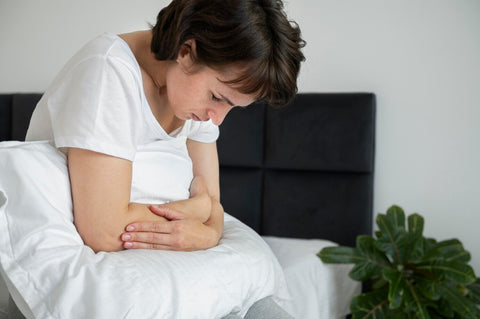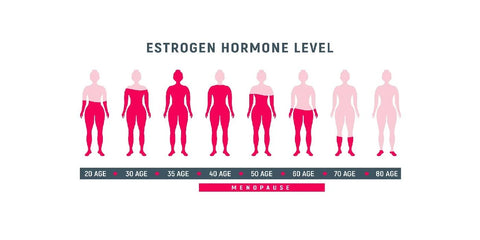Menopause and ovarian pain
Menopause is a natural stage in every woman's life, usually occurring between the ages of 45 and 55, marked by the end of menstrual cycles due to the cessation of ovarian function. Although this biological transition is normal, it can bring with it a series of uncomfortable symptoms that vary in intensity and duration. One of these symptoms, although less common, is ovarian pain. This discomfort can be disconcerting and worrying for many women, so it is important to understand its causes and the most effective ways to relieve it.
Why do ovaries hurt during menopause?
During menopause, estrogen and progesterone hormone levels fluctuate and eventually decrease significantly, which can trigger various symptoms. Ovarian pain at this stage can be due to several reasons:
1. Hormonal changes : Decreased estrogen levels can cause pre-existing conditions such as ovarian cysts or endometriosis to flare up (this occurs when tissue similar to the lining of the uterus grows outside the uterus and in other areas of your body where it doesn't belong). These conditions can cause pain due to inflammation and pressure on the pelvic organs.
2. Ovarian cysts : A cyst is a fluid-filled sac. They can form in numerous parts of the body, and ovarian cysts form in or on the ovaries. Although they are more common during reproductive age, they can persist or develop during menopause, causing abdominal pain. These cysts can be benign, but medical monitoring is crucial to avoid complications.
3. Adhesions or scars : Scars from previous surgeries, such as cesarean sections or gynecological surgeries, or from inflammatory diseases, can continue to cause discomfort in the pelvic region due to the formation of scar tissue that can restrict the movements of internal organs.
4. Other gynecological problems : Conditions such as pelvic inflammatory disease (infection and inflammation of the uterus, ovaries, and other female reproductive organs), uterine fibroids (noncancerous tumors), or even ovarian cancer, although less common, can manifest as pelvic pain during menopause. These problems require immediate medical attention for proper diagnosis and treatment.
5. Psychological and emotional factors : Stress and anxiety associated with the menopausal transition can intensify pain perception. Hormonal fluctuations can affect emotional state and contribute to pain sensitivity.
It is essential to consult a doctor for a proper diagnosis and to rule out any serious conditions. Persistent ovarian pain should never be ignored as it may be indicative of an underlying condition that needs medical attention.
How to relieve ovarian pain during menopause?
Managing ovarian pain during menopause may involve a combination of strategies , from lifestyle changes to medical treatments. Here are some practical and effective recommendations:
Menopausal Hormone Therapy (MHT) : Under medical supervision, Menopausal Hormone Therapy (MHT) can help balance hormone levels and reduce pain. MHT consists of the supply of estrogen and progesterone sequentially , since the production of estrogen decreases until it disappears throughout the menopausal transition, so it is replaced with hormones to recover the functions and beneficial effects that estrogen had in the woman's body.
Progesterone is only administered to women with a uterus, to prevent excessive growth of the endometrium (the inner layer that covers the uterus) as a result of the administration of estrogen. It is generally indicated for use in the first 10 years after menopause and in women under 60 years of age.
It is key to individualize with each woman and make it a shared therapeutic decision , where you are aware of the risks and benefits, assessing the situation with the help of a health professional.
Pain relievers : Over-the-counter medications such as ibuprofen or acetaminophen may provide temporary pain relief. In more severe cases, a doctor may prescribe stronger pain relievers. The ideal thing to do if you have recurring pain is to see a professional so that they can not only treat the specific symptom temporarily, but also get to the root cause and understand the underlying cause.
Heat : Applying a warm compress or heating pad to the abdominal area can relax the muscles and relieve pain. Heat helps improve blood circulation to the affected area, reducing muscle tension and discomfort.
Exercise : Regular physical activity improves blood circulation and reduces inflammation, helping to decrease pain. Gentle exercises such as yoga, pilates, and walking can be especially beneficial for maintaining pelvic and overall health.
Relaxation and stress management : Techniques such as yoga, meditation, and deep breathing can be beneficial in reducing pelvic pain. These practices help manage stress and anxiety, which can exacerbate pain.
Diets: Maintaining a balanced , nutrient-rich diet can help. Foods rich in omega-3s , such as oily fish and flax seeds, have anti-inflammatory properties.
Madequa Supplements : Certain supplements, like those from Madequa, are specifically designed to support women's health at each stage of menopause. If you don't know what stages you're in, you can take our test to find out.
Madequa offers a range of natural supplements formulated with gynecologists to help women navigate through menopause. With effective and scientifically proven doses . In addition, Madequa supplements can be combined with MHT.
Conclusion
Ovarian pain during menopause is an experience that can be managed with a combination of strategies, from MHT to healthier lifestyle changes including supplements, such as those offered by Madequa.
Ovarian pain, as we have discussed in this post, is often explained by a state of inflammation. Madequa supplements contain omega 3, among other active ingredients, which has significant anti-inflammatory properties , reducing the levels of other molecules that will be elevated and are responsible for generalized inflammation, common in menopause. The reduction of these levels translates into less inflammation and, therefore, better general health . At Madequa we seek to go to the origin and not just to the specific symptom, understanding menopause from a comprehensive approach.
It is important to note that you should seek the advice of a health professional to obtain an accurate diagnosis and an appropriate treatment plan, but remember that you are not alone and there are solutions that will help you go through menopause with confidence and well-being.
References
Jennifer Huizen. Why does perimenopause cause ovarian pain? Medical News Today . 2023.
Cheryl B. Iglesia, MDOvarian cysts. Office on Women's Health. 2021.
Roberts, H., Hickey, M.Managing the menopause: an update (English version). Maturitas . 2016; 201;86:53-8.
Buck, LGM, Hediger, ML, Peterson, CM, Croughan, M., Sundaram, R., Stanford, J., Chen, Z., et al. Incidence of endometriosis by study population and method of diagnosis: the ENDO study. Fertility and Sterility. 2011; 96(2): 360-5.
American College of Obstetricians and Gynecologists. Management of endometriosis. Obstetrics & Gynecology. 2010; 116(1), 223–236
AEEM-SEGO position statement on menopausal hormone therapy. Prog Obstet Ginecol 2018;61(3):230-234. 234. doi: 10.20960/j.pog.00094
Bernasconi AA, Wiest MM, Lavie CJ, Milani RV, Laukkanen JA. Effect of Omega-3 Dosage on Cardiovascular Outcomes: An Updated Meta-Analysis and Meta-Regression of Interventional Trials. Mayo Clin Proceedings . 2021;96(2):304-313. doi: 10.1016/j.mayocp.2020.08.034.




Comments (0)
There are no comments for this article. Be the first one to leave a message!